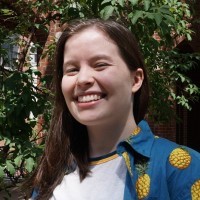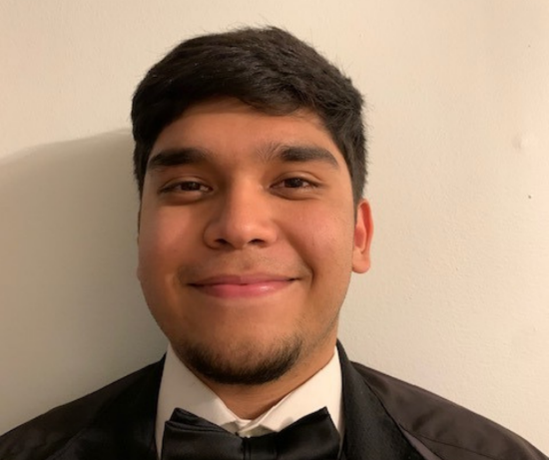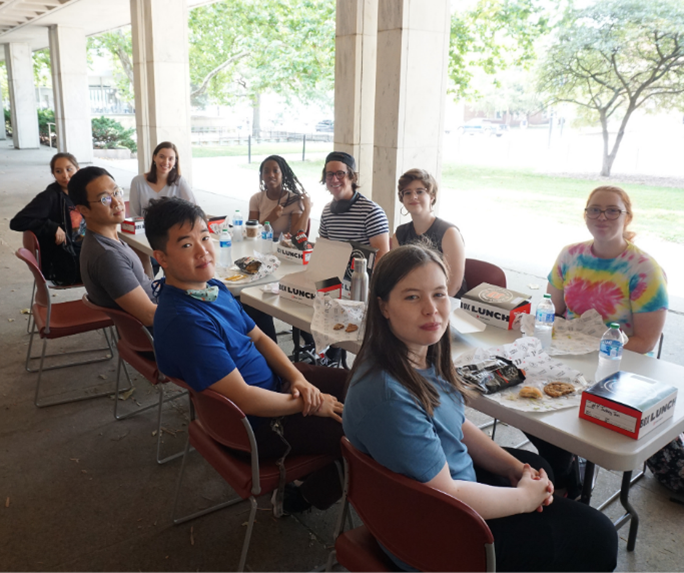Undergrads get a taste of research through I-MRSEC’s REU program

Dr. C.Q. Chen, a Materials Research Lab staff scientist, shows (left to right) REU participants Ross Lee, Sophie Roberts (in background), and Diana Hernandez one of the MRL’s transmission electron microscopes during a tour of the lab in July 2021.
This summer, Sophie Roberts took a leap forward on her career path to becoming a professor at a research university. Roberts, now a senior physics major at the University of Northern Iowa, was one of 10 undergraduates from across the US who participated in the Illinois Materials Research Science and Engineering Center’s (I-MRSEC) Research Experiences for Undergraduates (REU) program. “I wanted to learn more about materials science,” she said of her interest in participating in the program. “My background is condensed matter physics, which is related to materials science. So, I hoped to explore the field to determine which graduate programs to apply to – physics, materials science, or both.”
Now in its fourth year at the University of Illinois, the 10-week summer research program offers incoming college juniors and seniors studying engineering, physics, chemistry, materials science, or a related field the opportunity to work closely with faculty members to participate in some of the ongoing, interdisciplinary research programs on campus. Funded by a National Science Foundation (NSF) grant, the program also provides training to help the students in their professional development as scientists and engineers with particular emphasis on the skills related to communicating their scientific discoveries to help broaden its reach and make science more accessible.

Sophie Roberts, MRSEC REU participant
Roberts and fellow REU participant Armando Hernandez, now a junior majoring in mechanical engineering at Illinois, said the program--held virtually for the most part from June 1 through August 6—provided them with a rare opportunity to be a part of a scientific research group and not only see how research is conducted but also participate. Roberts’ research project was Corrective Optics for Quantum Diamond Microscope (QDM), and she presented her findings during I-MRSEC’s Undergraduate Symposium in August. She said her research could be used to design a physical system of lenses that could be introduced into the QDM to help minimize the aberrations in the system. “The QDM could then be used to investigate the magnetic properties of two-dimensional samples,” she said. “At other institutions, the QDM has even been used to characterize geological samples to understand how the earth’s magnetic field has changed over time.” Roberts was mentored by David Cahill, professor and Grainer Distinguished Chair in Engineering, the Donald B. Willett Professor of Engineering, and the leader of one of MRSEC’s interdisciplinary research groups; and Dr. Myoung-Woo Yoo, a postdoctoral researcher with the Hoffmann, Lorenz, and Cahill Research Groups at the Materials Research Lab on campus. “I had daily meetings with Dr. Yoo where we would talk about research progress and figure out what was our next step. I also had weekly meetings with both Professor Cahill and Dr. Yoo. They were both incredibly helpful and gave me a lot of great advice over the course of the project.”
Roberts got to visit campus during the last four weeks of the program; meet her mentor, others in the MatSE department, and other REU participants; and got a tour of the Materials Research Lab from Cahill.
“This was really interesting because I got to see the facilities being used for projects similar to mine,” Roberts said, adding the program put Illinois “and the Materials Science program on my radar for graduate school, and I would consider continuing that work if I go there. Ultimately, my work gave me insight into a novel technique I had no experience with. This experience will be valuable in any future research endeavors.”

Armando Hernandez, MRSEC REU participant
During the program, Hernandez and fellow REU participant Diana Hernandez (no relation) worked on a project called “Raman Spectrum: Graphene.” Their mentors were: Elif Ertekin, an associate professor, MRSEC faculty member, and investigator in a MRSEC interdisciplinary research group, Anderson Faculty Scholar, Director of the Mechanics Programs (MechSE), and director of the Nanomanufacturing Node(NanoMFG); Sameh Tawfick, associate professor of MechSE, who is also involved in the NanoMFG; Aagam Shah, a doctoral student in the MatSE program; Isiah Ramos, an undergraduate research assistant and a 2020 MRSEC REU alumnus; Mitisha Surana, a doctoral student in the MatSE program; and Darren Adams, a senior research programmer at the National Center for Supercomputing Applications, who is also involved in the NanoMFG.
Pena Martin said a few years ago, Ertekin asked if the NanoMFG could partner with MRSEC to support a few students in the program. This year, the center’s grant supported Armando and Diana Hernandez’s participation.
“Basically, what I was tasked to do with my colleague (Diana), was to develop a coding for laser wavelength, signal to noise ratio, background subtraction, and strain and doping,” said Armando Hernandez, who was matched to the research based on his interest in nanotechnology.
Hernandez, who transferred to Illinois from Wilbur Wright College in Chicago this fall, learned about the REU program from his transfer coordinator a couple of weeks before the program application was due. He jumped at the chance to work with professors he might interact with through his major, and “I wanted to experience (conducting) research and figure out if I wanted to continue with that … in graduate school.”
Hernandez enjoyed working with his student mentors, whom he met with nearly every day, and professor mentors, whom he met with on Fridays and “were super friendly and supportive in everything we did.
However, “I realized that research was not for me,” said Hernandez, who currently envisions a different path for himself.
“The reason I have pursued mechanical engineering is (that) … I’m focused on making current objects more efficient and environmentally friendly, especially in this time when we see all these crazy weather disasters and drastic changes happening,” said Hernandez, who hopes to work as a mechanical engineer with a company like John Deere or Chevron, later pursue an MBA, and eventually start his own eco-friendly company.
“Of course, in life, I learned never say never because you really never know. I could say I don’t want to do research as of now, but I can change my mind along the line later on,” he continued, adding either way, the program was a priceless experience.

REU participants and faculty and student mentors enjoy a final lunch on campus in August 2021. Pictured (counterclockwise from furthest right) are: Participants Sarah Longworth, Ashlie Hamilton, Ross Lee, Kamila Thompson, MRSEC students Andrea Perry and Azel Murzabekova, MRSEC postdoc and REU mentor Dr. Myoung-Woo Yoo, MRSEC student and REU mentor Edmund Han, and participant Sophie Roberts.
Besides their research experience, Roberts and Hernandez said they gained other valuable skills through the REU program, including how to apply to graduate school and for fellowships, how to write scientific papers, how to code.
“These are all useful skills that will help me both as a student and in my career,” Roberts said, who is applying to graduate school and for fellowships this fall.
“They had a lot of workshops for (writing) resumes and (applying to) graduate school that were very helpful in figuring out what we want to do and how to improve professionally in terms of what they were looking for,” Hernandez added.
So, what advice would Roberts and Hernandez give to other students who are considering applying to the MRSEC REU program?
“Sometimes it can feel a little isolating while doing online research,” Roberts said, “so it is important to develop a good relationship with you mentors and maintain open lines of communication with them. It is also important to communicate with your mentors the goals for your project early but be okay if something does not go as planned, and you need to change your goals. Research is a process. Appreciate the learning that happens along the way. The program is a lot of fun, so I’d highly recommend it.” Hernandez agreed.
“It is really great in terms of structure and the information they provide to you,” he said. “They also want to make sure you talk to other research students and connect with them to make friendships.”
At the close of the Undergraduate Symposium, Pamela Pena Martin, I-MRSEC’s outreach coordinator and coordinator of the REU program, congratulated all of the participants on their presentations and their time in the program.
“They’ve just done a really amazing job,” Pena Martin said, adding she was grateful to all of the mentors for their support, “which is critical to the program.”
"Hopefully, you all made connections and learned some skills … in the program,” said Pinshane Huang, a former REU participant who is now an associate professor in the Department of Materials Science and Engineering (MatSE). During this year’s program, Huang mentored REU participant Ashlie Hamilton.I still use those skills today.”
Story by: Noelle Laghmam
Photos by Pamela Pena Martin












.jpg)
















